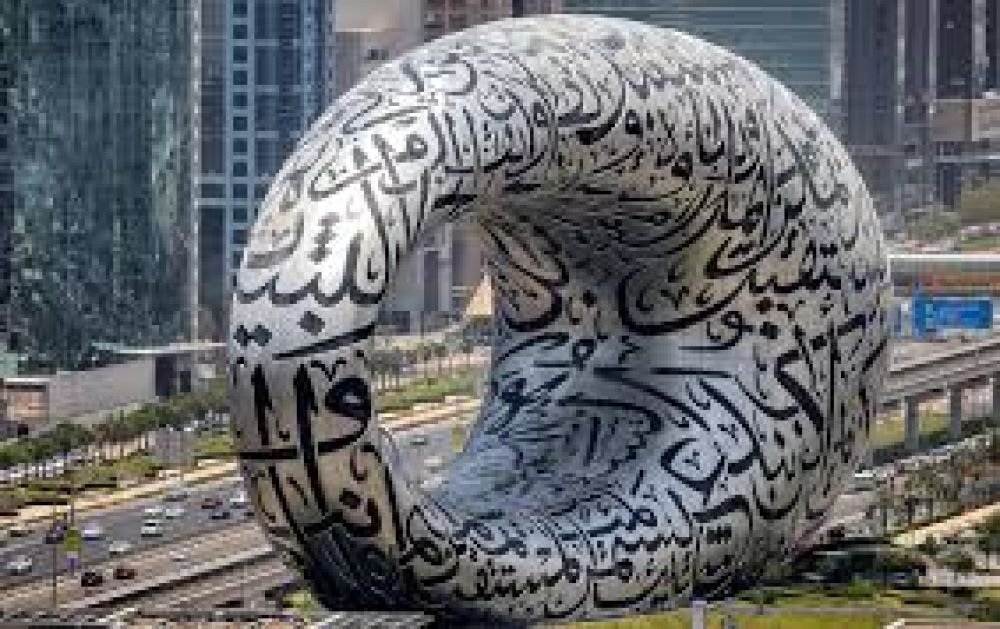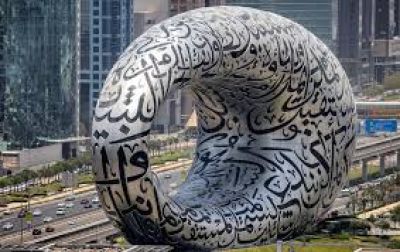

Experience the rich history and cultural heritage of the United Arab Emirates with a tour of the Dubai Museum. Located in the Al Fahidi Fort, the oldest existing building in Dubai, this museum offers a comprehensive look at the traditional way of life in the Emirate of Dubai. The museum comprises several galleries, showcasing local antiquities along with artifacts from African and Asian countries that traded with Dubai. Learn about the pearl diving trade, which was a cornerstone of the city's economy, and see a variety of traditional boats, weapons, and musical instruments. Exhibitions also present the dramatic transformation of Dubai from a humble fishing village to a global metropolis, with interactive displays and life-size dioramas that bring historical scenes to life.
Take a step back in time as you meander through the Al Fahidi Historical Neighbourhood, which is in close proximity to the Dubai Museum. This area is one of the oldest in Dubai, characterized by its traditional wind-tower architecture and maze-like alleyways. Enjoy a walking tour where you can observe the restored historic buildings now housing art galleries, cafés, and shops. As you explore, you will learn about the lifestyle that existed before the skyscrapers and luxury cars, offering a stark contrast to modern Dubai. This activity combines cultural immersion with architectural appreciation and provides a sense of the community that existed in bygone eras.
After immersing yourself in history at the Dubai Museum and exploring the Al Fahidi neighborhood, relax and unwind at the Arabian Tea House. This quaint and picturesque café offers a tranquil escape with its blue and white decor and lush garden setting. Indulge in traditional Emirati and Middle Eastern snacks, along with a variety of teas and Arabian coffee. The ambiance reflects the serene and welcoming nature of Emirati culture, making it an ideal spot to reflect on the history you've just witnessed. With its authentic atmosphere and delicious fare, a stop at the Arabian Tea House is more than a meal—it's a cultural experience in itself.
Dubai's artistic heritage can be appreciated through the beauty of Arabic calligraphy, and the Dubai Museum vicinity often hosts workshops where you can learn this precious art form. Under the tutelage of local artisans, you'll learn about the various scripts used historically and today. During the workshop, you will be guided in the creation of your own calligraphy, which is an artful and meditative process. Not only will you get a deeper appreciation for the script's aesthetic, but you will also gain insight into its significance in Emirati culture and Islamic tradition.
The Coin Museum in the Al Fahidi Historical Neighbourhood houses a unique collection of historic coins, some of which date back centuries. It's a short walk from the Dubai Museum and provides a specialized glimpse into the economic history of Dubai and the region. Spread across two stories, the museum displays coins that were used in the area before the United Arab Emirates was formed, as well as some from the early years of the federation. The detailed descriptions offer insights into trade and commerce as well as the shifting power dynamics in the Gulf and broader Middle East.
Just a few minutes away from the museum, along the Dubai Creek, you can embark on a picturesque dhow cruise. These traditional wooden boats, once used for trade and pearl diving, now offer leisurely tours of the Creek. As you glide along the water, you'll see the stark contrast between Old Dubai's historic charm and the modern skyline. The tour often includes commentary on the historical relevance of the waterway and is a relaxing way to sightsee and appreciate Dubai's origins and evolution. An evening dhow cruise often includes dinner with a selection of Emirati and international dishes.
The Heritage Village, located in the Shindagha area near the Dubai Museum, recreates the traditional lifestyle and culture of the Emirati people. It includes reconstructions of Bedouin tents, old fishing villages, and traditional markets. Visitors can observe craftspeople at work, creating pottery, weaving, and metal works using techniques passed down through generations. Additionally, the village hosts cultural festivals and events that showcase folk dances and music, providing an entertaining and enriching experience for visitors interested in the United Arab Emirates' cultural practices.
A visit to Dubai is not complete without an 'abra' ride across the Dubai Creek, which is minutes away from the Dubai Museum. The abra is a traditional wooden vessel that has been ferrying people across the Creek for decades. This mode of transport offers a unique perspective of the city and a glimpse into the everyday lives of residents. The ride connects the Deira and Bur Dubai sections of the city and is an efficient and enjoyable way to travel between these two bustling market areas. This experience is both affordable and authentic, giving you a moment to relax and take in the surrounding views.
While the Dubai Museum is fascinating during the day, some special evening tours provide a different atmosphere altogether. Explore the museum and the Al Fahidi Fort under the ambient lighting of the evening, which highlights the architecture and exhibits in a new light. This tour often comes with a knowledgeable guide who can share enchanting stories and details that bring the past to life, emphasizing the changes Dubai has undergone. The cooler evening temperatures and an often less crowded environment make for a peaceful and unique experience.
The Sheikh Mohammed Centre for Cultural Understanding (SMCCU) offers a deep dive into Emirati culture and traditions. Located in the Al Fahidi Historic District near the Dubai Museum, the SMCCU promotes cross-cultural understanding and provides visitors with the opportunity to ask questions about local customs, religion, and traditions. Experience a traditional Emirati breakfast or lunch and engage in open conversation in the spirit of the center's motto, 'Open Doors, Open Minds'. The Center also offers heritage tours and mosque visits, enhancing the overall cultural understanding for visitors.
